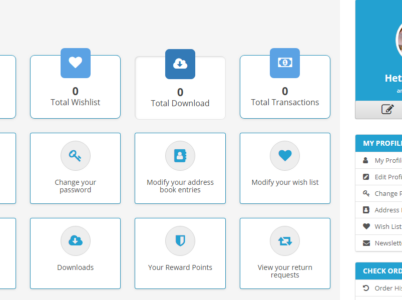AShop is a cutting-edge payment processor software specialising in providing businesses with a comprehensive eCommerce platform. It offers various tools and features to help merchants establish and manage their online stores effectively. AShop is available to simplify the complexities of eCommerce and empower businesses to succeed in the competitive digital marketplace.

- User-friendly interface: OpenCart has an instinctive and easy-to-use interface that form it smooth for customers to control their online store.
- Customizable themes: OpenCart presents a range of customizable themes and templates that admit customers to form a unique and visually appealing online store.
- Payment and shipping choices: OpenCart supports an off-course range of payment and shipping options, containing PayPal, credit cards, and shipping carriers like UPS and FedEx.
- Multi-store functionality: OpenCart assigns consumers to control multiple stores from a single dashboard, building it easy to develop their online business.
- Product management: OpenCart allows a range of tools to help consumers control their products, containing the capability to include product descriptions, images, and pricing.
- Shopify: Shopify is a common e-commerce platform that presents a range of features, containing customizable themes, payment and shipping choices, product management tools, and SEO-friendly features.
- WooCommerce: WooCommerce is a plugin for WordPress that turns a WordPress site into an e-commerce store. It suggests a range of features, containing customizable themes, payment and shipping choices, and product management tools.
- Magento: Magento is an open-source e-commerce platform that proposes a range of features, containing customizable themes, payment and shipping choices, product management tools, and SEO-friendly features.
- BigCommerce: BigCommerce is an e-commerce platform that allows a range of features, containing customizable themes, payment and shipping choices, product management tools, and SEO-friendly features.
- PrestaShop: PrestaShop is an open-source e-commerce platform that presents a range of features, containing customizable themes, payment and shipping choices, product management tools, and SEO-friendly features.
OpenCart may be customized and themed by modifying its codebase or by utilizing existing extensions and themes. Customizing OpenCart needs programming knowledge, and theme development can be done using HTML, CSS, and PHP. OpenCart themes may be purchased from third-party marketplaces or developed in-house.
OpenCart SEO optimization for higher search ranking
OpenCart may be optimized for SEO by utilizing SEO-friendly URLs, optimizing product descriptions and titles, adding metadata to pages, developing site speed, and implementing a mobile-friendly design. Furthermore, OpenCart can be integrated with accompanying SEO extensions to upgrade search engine visibility and rankings.
OpenCart payment gateway integration for secure transactions
OpenCart can integrate accompanying various payment gateways like PayPal, Stripe, Authorize.net, and more. These integrations allow for secure transactions by utilizing SSL encryption and PCI compliance. OpenCart further supports miscellaneous payment methods like credit cards, debit cards, and digital wallets to supply a seamless checkout experience for clients.
OpenCart multilingual and multicurrency support
OpenCart supports multilingual and multicurrency features by allowing consumers to form and control numerous languages and currencies in their store. The platform specifies language packs for various languages and admits users to set up various currencies for different regions. Additionally, OpenCart supports automatic currency conversion and language switching depending on the consumer’s location.

OpenCart is a user-friendly open-source e-commerce platform that allows users to create and manage online stores for selling products or services. Initially released in 2009, it has gained popularity for its simplicity and customizable features. OpenCart offers an intuitive interface, a wide range of payment and shipping options, and various third-party extensions to enhance store functionality. Users can manage multiple stores from a single dashboard, create and oversee products, and track sales and customer data. It also provides a variety of templates and themes for users to choose from, making it easy to create visually appealing online stores.
- Cost: OpenCart is a free, open-source platform, while Shopify needs a monthly subscription fee. However, OpenCart can require additional costs for hosting, themes, and plugins.
- Customization: OpenCart presents more customization choices, containing more themes and plugins, than Shopify. However, Shopify has a more convenient interface and smooth-to-use customization tools.
- Features: Shopify suggests more built-in features, containing more payment and shipping choices, better SEO tools, and better client support. OpenCart requires consumers to rely on third-party extensions for some features.
- Technical expertise: OpenCart needs more technical expertise to set up and use than Shopify, building it better suited for trades with a technical team or web developer. Shopify, in other way, is more convenient and smoother to use for non-technical consumers.
OpenCart vs WooCommerce
- Cost: OpenCart is a free, open-source platform, while WooCommerce is a free plugin for WordPress. However, both programs can demand additional costs for hosting, themes, and plugins.
- Customization: OpenCart presents more customization choices, containing more themes and plugins, than WooCommerce. However, WooCommerce allows consumers to easily integrate with additional WordPress plugins and customization choices.
- Features: OpenCart proposes more built-in features, containing more payment and shipping choices, better SEO tools, and better customer support. However, WooCommerce suggests more adaptability accompanying product management, like the capability to build variable products accompanying various attributes.
- Technical expertise: OpenCart demands more technical expertise to set up and use than WooCommerce, building it better suited for businesses accompanying a technical team or web developer. WooCommerce is smooth to use and more approachable for non-technical consumers.
OpenCart vs PrestaShop
- Cost: OpenCart is a free, open-source platform, while PrestaShop presents both a free and paid version. However, both platforms can demand supplementary costs for hosting, themes, and plugins.
- Customization: OpenCart suggests more customization choices, containing more themes and plugins, than PrestaShop. However, PrestaShop has a more convenient interface and smooth-to-use customization tools.
- Features: PrestaShop proposes more built-in features, containing better SEO tools, and better support for numerous languages and currencies. However, OpenCart suggests more payment and shipping choices.
- Technical expertise: OpenCart demands more technical expertise to set up and use than PrestaShop, building it better suited for trades with a technical team or web developer. PrestaShop is more convenient and smoother to use for non-technical consumers.
Zen Cart is an open-source e-commerce platform that enables users to create online stores with ease. It offers an extensive range of features, including product management, order management, shipping and payment integration, and customer management. Zen Cart is highly customizable and can be tailored to fit the specific needs of a business. It provides a user-friendly interface, making it accessible even for those with little or no experience in web development.
Zepo is an e-commerce platform designed to assist small businesses in India in establishing and operating their online stores. Founded in 2011, Zepo offers a variety of features and services to support businesses in selling their products online. These include website design and development, payment gateway integration, inventory management, and marketing tools.





